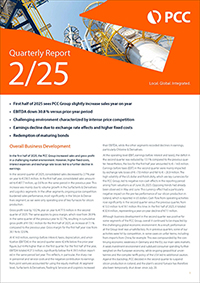Joint project to support the energy transition: Development of innovative components for high-performance energy storage systems
The Duisburg-based high-tech company PCC Thorion GmbH, a subsidiary of PCC SE, together with the Fraunhofer Institute for Solar Energy Systems ISE and Glatt Ingenieurtechnik GmbH, has received federal funding of 2.6 million euros for a project to improve the performance of electricity storage systems. The aim of the joint project is to develop new materials that improve both the performance and environmental compatibility of lithium-ion batteries, which are needed for the energy transition. This is because stationary storage systems for surplus electricity from solar and wind power are required for a higher proportion of renewable energies in the electricity mix. The project for the “Development of structure- and surface-optimized silicon anodes and high-energy cathodes for energy-dense lithium-ion batteries for stationary energy storage solutions” (StrOboBatt) is scheduled to run for three years.
“The partnership between PCC Thorion GmbH, the Fraunhofer Institute for Solar Energy Systems ISE and Glatt Ingenieurtechnik GmbH is a significant step toward sustainable energy storage solutions,” explains Enrico Roicke, Managing Director of PCC Thorion GmbH. “It combines the expertise and resources of the companies involved as well as numerous other industrial and development partners.” These include E-Lyte Innovations GmbH, LG Chem Europe GmbH and UniverCell Holding GmbH.
The companies involved in the StrOboBatt project are working on the development of a whole range of important components for lithium-ion batteries. For example, PCC Thorion is developing silicon-based materials to improve the anodes in the batteries. The basis for these innovative materials is silicon nanopowder, which is obtained from the silicon metal produced by sister company PCC BakkiSilicon hf. in Iceland. A composite made of silicon and carbon, developed jointly with Fraunhofer ISE, provides an anode active material with an energy density several times higher than the graphite usually used and therefore significantly increases the capacity of lithium-ion batteries. The StrOboBatt project focuses in particular on the surface optimization of this material in order to increase its longevity and optimize its performance in lithium-ion batteries in combination with additives. A powder synthesis technology developed by Glatt Ingenieurtechnik is being used for this purpose.
The StrOboBatt project also focuses on the development of cobalt- and nickel-free cathodes and their coating, as well as on the integration of environmentally friendly technologies to reduce the ecological footprint of battery production. By using water instead of organic and toxic solvents as a sustainable, environmentally friendly solvent, energy costs and thus cell production costs can be drastically reduced.

